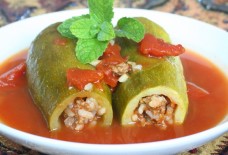New York Muslims Mark Eid Holiday and Celebrate Strides
by
NBC News
Zahida Ali, 62, is one American woman who takes her right to vote seriously. Influenced largely by her daughter, Faiza Ali, who works as a liaison to the New York Muslim community for Council Speaker Melissa Mark-Viverito, she votes in presidential elections, local elections and even during primaries. Ali emigrated to the United States from Kashmir in 1973 and is a practicing Muslim.
“Brooklyn and New York City became our home and if we want to build this home and our community, we need to be heard,” she said.
Ali, and her Muslim community, have made themselves heard in unprecedented ways over the last few years in New York, by earning recognition and legislative influence for the issues that matter most to them. As the nearly one million Muslims in New York City celebrate the Eid holiday, marking the end of the holy month of Ramadan, many are also noting the strides their community has made.
“We are seen as a much more influential community,” said Linda Sarsour, Executive Director of the Arab American Association of New York and co-founder/board member of the Muslim Democratic Club of New York (MDCNY). “People are starting to see us as a very organized political force in New York City.”
Sarsour says she’s seen a much younger, more engaged segment of the population unafraid to engage in civil action to advocate for change.
“Back in the day when I was doing this work 15 years ago, people doing activist work were much older,” said Sarsour. “What I see now is the 30-year old, the college students, and the high school students…We’re creating a pipeline of leadership in the Muslim community that was not there before.”
Earlier this year, a nearly decade-long campaign to add two Muslim holidays — Eid-ul-Fitr and Eid-ul-Adha — to the New York City public school calendar finally paid off. Sarsour described it as, “the biggest political victory that the Muslim community has seen in the last 20 years.”
An estimated ten percent of the city’s total public school enrollment is comprised of Muslim students.
“Hundreds of thousands of Muslim families will no longer have to choose between honoring the most sacred days on their calendar or attending school,” said Mayor Bill de Blasio in a press release.
Ali calls the achievement part of the Muslim community’s organizing story.
“It is a blueprint for how we can build power from the ground up,” she said, “and it is proof that if we mobilize, we can win. It feels like we’ve finally entered the major leagues.”
City administrators have also taken pains to make sure Muslim voices are represented within their own ranks. Every citywide official now has at least one staffer whose role it is to conduct outreach to the community. Charles Fall was appointed to Mayor Bill De Blasio’s administration as the Citywide Islamic Liaison. Faiza Ali is the first dedicated liaison to the Muslim community for the Speaker of the Council. According to Public Advocate Letitia James’ office, several of her staff are involved in similar outreach, including her Chief of Staff, Ibrahim Khan. Last month, the mayor appointed Sarah Sayeed as a Senior Advisor in the Community Affairs Unit, specializing in issues related to the city’s Muslim community. Sayeed is the first person to serve in such a role within her unit.
“Muslim New Yorkers are not a monolith,” said Sayeed. “To increase civic engagement, we must be aware of and sensitive to the cultural and linguistic diversity of Muslims in New York.”
But members of the Muslim community are not just being folded into official sphere. They are also being courted for their potential votes.
Christine Quinn, who previously served as the City Council Speaker, said at a 2013 event marking the breaking of the Ramadan fast, that, “The days of ignoring the interests and the significance of this community, those days are over.”
That same year, six Democratic mayoral candidates and one Independent participated in a forum organized by NYU’s Islamic Center and the Arab American Association of New York, tackling topics like police surveillance and racial profiling. Republican candidates were reportedly invited but did not attend.
Mayoral candidate John Liu reportedly visited mosques every Friday while campaigning and was also one of the few politicians to support a plan to include halal meals in public schools to accommodate the dietary restrictions of Muslim children.
Sarsour says that even though the potential political power of this group is getting notice, the Muslim vote is not yet as potent as it should be.
“We are better in districts where we are highly concentrated,” she said, referring to Bay Ridge, Brooklyn and District 23 in Queens. MDCNY estimates there are about 105,000 registered Muslim voters in New York City, based on surnames alone.
“In order to flex some real muscle,” said Faiza Ali, “we need full participation from those registered voters…This is no easy task.”
Ali’s mother is hoping her dedication will set an example for the larger community. The diminutive mother, standing just four feet nine inches tall, understands her daughter’s commitment to the cause.
“I don’t like all of the late work nights but helping the community is important to Faiza,” said the elder Ali. “Like me, she is tiny but works hard.”


